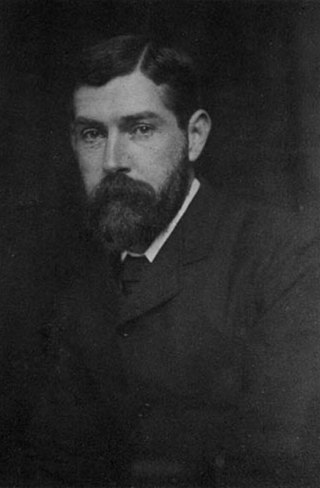Related Research Articles
Ethics is the philosophical study of moral phenomena. Also called moral philosophy, it investigates normative questions about what people ought to do or which behavior is morally right. Its main branches include normative ethics, applied ethics, and metaethics.

George Edward Moore was an English philosopher, who with Bertrand Russell, Ludwig Wittgenstein and earlier Gottlob Frege was among the initiators of analytic philosophy. He and Russell began deemphasizing the idealism which was then prevalent among British philosophers and became known for advocating common-sense concepts and contributing to ethics, epistemology and metaphysics. He was said to have an "exceptional personality and moral character". Ray Monk later dubbed him "the most revered philosopher of his era".

George Santayana was a Spanish-American philosopher, essayist, poet, and novelist. Born in Spain, Santayana was raised and educated in the United States from the age of eight and identified as an American, yet always retained a valid Spanish passport. At the age of 48, he left his academic position at Harvard University and permanently returned to Europe; his last will was to be buried in the Spanish Pantheon in the Campo di Verano, Rome.
George Moore or More may refer to:
Crispin James Garth Wright is a British philosopher, who has written on neo-Fregean (neo-logicist) philosophy of mathematics, Wittgenstein's later philosophy, and on issues related to truth, realism, cognitivism, skepticism, knowledge, and objectivity. He is Professor of Philosophical Research at the University of Stirling, and taught previously at the University of St Andrews, University of Aberdeen, New York University, Princeton University and University of Michigan.

Events from the year 1873 in Canada.

The American Academy of Arts and Sciences is one of the oldest learned societies in the United States. It was founded in 1780 during the American Revolution by John Adams, John Hancock, James Bowdoin, Andrew Oliver, and other Founding Fathers of the United States. It is headquartered in Cambridge, Massachusetts.

A subset of absolute idealism, British idealism was a philosophical movement that was influential in Britain from the mid-nineteenth century to the early twentieth century. The leading figures in the movement were T. H. Green (1836–1882), F. H. Bradley (1846–1924), and Bernard Bosanquet (1848–1923). They were succeeded by the second generation of J. H. Muirhead (1855–1940), J. M. E. McTaggart (1866–1925), H. H. Joachim (1868–1938), A. E. Taylor (1869–1945), and R. G. Collingwood (1889–1943). The last major figure in the tradition was G. R. G. Mure (1893–1979). Doctrines of early British idealism so provoked the young Cambridge philosophers G. E. Moore and Bertrand Russell that they began a new philosophical tradition, analytic philosophy.
Events in the year 1901 in Ireland.

In late modern philosophy, neo-Kantianism was a revival of the 18th-century philosophy of Immanuel Kant. The neo-Kantians sought to develop and clarify Kant's theories, particularly his concept of the thing-in-itself and his moral philosophy.
John Henry Muirhead was a Scottish philosopher best known for having initiated the Muirhead Library of Philosophy in 1890. He became the first person named to the Chair of Philosophy at the University of Birmingham in 1900.

Mind is a quarterly peer-reviewed academic journal published by Oxford University Press on behalf of the Mind Association. Having previously published exclusively philosophy in the analytic tradition, it now "aims to take quality to be the sole criterion of publication, with no area of philosophy, no style of philosophy, and no school of philosophy excluded." Its institutional home is shared between the University of Oxford and University College London. It is considered an important resource for studying philosophy.
The definist fallacy is a logical fallacy, identified by William Frankena in 1939, that involves the definition of one property in terms of another.
The Tarner lectures are a series of public lectures in the philosophy of science given at Trinity College, Cambridge since 1916. Named after Mr Edward Tarner, the lecture addresses 'the Philosophy of the Sciences and the Relations or Want of Relations between the different Departments of Knowledge.' The inaugural lecture was given by Alfred North Whitehead in the autumn of 1919 and are published as his "The concept of nature."
The paradox of analysis is a paradox that concerns how an analysis can be both correct and informative. The problem was formulated by philosopher G. E. Moore in his book Principia Ethica, and first named by C. H. Langford in his article "The Notion of Analysis in Moore's Philosophy".

British philosophy refers to the philosophical tradition of the British people. "The native characteristics of British philosophy are these: common sense, dislike of complication, a strong preference for the concrete over the abstract and a certain awkward honesty of method in which an occasional pearl of poetry is embedded".
The Dean of Clogher is a dignitary of the Diocese of Clogher within the Church of Ireland. The title may be held by any licensed incumbent in the diocese, not necessarily the rector of one of the cathedral parishes of Clogher. The Dean, with the Cathedral chapter, has responsibility for the cathedral life of St Macartan's, Clogher and St Macartin's, Enniskillen.
1929 in philosophy
1925 in philosophy
References
- ↑ Preston, Aaron. "George Edward Moore (1873—1958)". The Internet Encyclopedia of Philosophy (IEP). Retrieved 23 January 2013.
- ↑ Baldwin, Tom. "George Edward Moore". The Stanford Encyclopedia of Philosophy (SEP). Retrieved 24 January 2013.